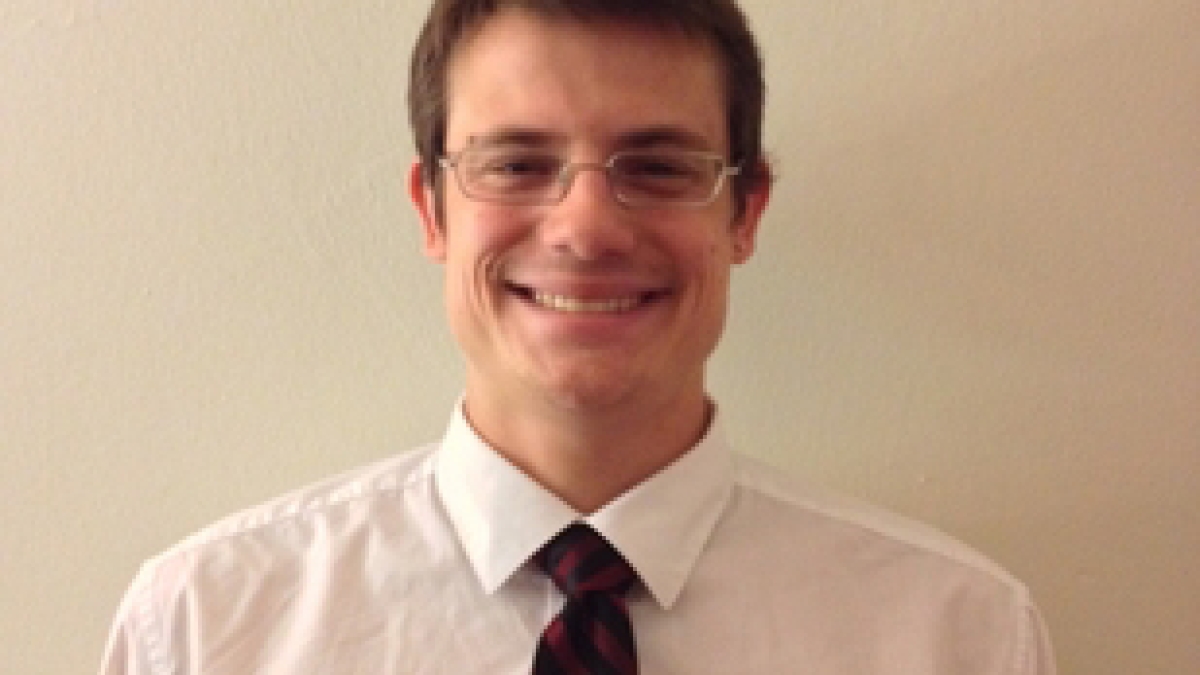Alum solving problems of hospital waste, sustainability

During middle school summer camp, Rud Moe backpacked the Appalachian Trail. From peak after peak, he looked out over the forested landscape. And time after time, the view was scarred by muddy pits – the result of logging operations.
Moe also saw areas where new trees had been planted to replace those that had been cut down. “I realized that there are ways humans can manage acquiring the resources we need without ruining the land forever,” Moe says.
Moe loved being outdoors in the wilderness. When it came time for college, he looked for areas of study that would bring him back to the outdoors. He considered schools with environmental sciences programs and ultimately turned down the University of Maryland and Colorado University (Boulder) to come to Arizona State University’s School of Sustainability.
“When I first visited, I fell in love with the campus immediately,” says Moe. “I just had a feeling that this was the place I wanted to be.” He enrolled through Barrett, the Honors College, in the School of Sustainability and the School of Earth and Space Exploration.
At the School of Sustainability, Moe learned to look at the big picture when considering problems and their solutions. He graduated in 2013 with bachelor's degrees in sustainability and geology, as well as a certificate in geographic information systems.
Today, the native of Cheverly, Md., is a hospital sustainability specialist for Stericycle, stationed in Memphis, Tenn. Moe helps hospitals manage their waste streams and assists them with waste-related problems.
So much is thrown away in the medical industry because equipment has to be sterilized with alcohol wipes and many procedures require new equipment to be used on each patient. Moe always wondered where all that waste went and whether it was necessary. “Now I have an insider's view and get to take an active role in reducing it.”
He says the School of Sustainability gave him a leg up in landing his position. “Many people, and many I have interacted with here in Tennessee, still have no idea what sustainability means or why it is important,” says Moe. “Having studied it for so many years, I do not have to be trained on any of the basic ideas and motivations behind Stericycle's goals.”
Moe helps the hospitals achieve their goals of reducing certain categories of waste and increasing recycling. He also looks for ways to save money for the hospital and his company. He explains the sustainability connection.
“In the past, most of a hospital's trash was disposed as hazardous medical waste, which requires expensive and environmentally damaging processes, like incineration," Moe explains. "In some cases, dangerous pharmaceuticals are just thrown down the drain and eventually end up in local ecosystems or in our water supply. Stericycle provides hospitals with the training and infrastructure needed to properly sort their waste and increase recycling, which helps the environment, saves the hospitals money and reduces the strain on landfills.”
Moe says that one of the best parts of his job is that he gets to use what he learned at ASU to organize specialists from different departments and ensure that one person's solution is not another's new problem.
Something unexpected prepared him for this role. “Almost all of my classes at ASU included group projects and collaboration, and at the time, it was sometimes a drag,” confesses Moe. “But nothing has prepared me more for this job. Every day I have to interact with new people from different backgrounds, different companies and with different levels of experience. Often we do not share the same views on what is important, but we still have to come together and get work done.”
Moe still doesn’t know what his true dream job is. He hasn’t ruled out being a park ranger. For now, he says, “as long as I can add value and contribute to positive change in the world, I will be happy. I think at Stericycle I already have a good start down that path.”